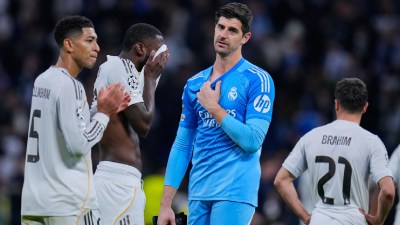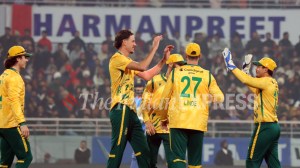The complex legacy of Mikhail Gorbachev: The global leader Russia needed but did not want
Following the death of Soviet leader Mikhail Gorbachev earlier this week, tributes flew in towards the man who oversaw the collapse of the USSR and facilitated the end of the Cold War. However Gorbachev was a polarising figure in his homeland as many Russians blamed him for the collapse of the empire. Looking back at his foreign policy reveals a complex man whose policies, intended or otherwise made him one of the most influential leaders of our time.
 Gorbachev’s foreign policy won him veneration internationally, but in Russia, his legacy remains highly contested. (Express Archive Photo)
Gorbachev’s foreign policy won him veneration internationally, but in Russia, his legacy remains highly contested. (Express Archive Photo)On June 12, 1987, US President Ronald Reagan urged his Soviet counterpart to join the cause for a peaceful reunification of Germany. “Mr. Gorbachev, tear down this wall!” he implored.
Two years later, Mikhail Gorbachev acquiesced to Reagan’s demands, standing by, as the Berlin Wall, a powerful symbol of the East West divide, came crashing down, pulling the Soviet Union with it soon after.
Gorbachev was the last leader of the USSR, serving both as its general secretary and later president from 1985 until its collapse in 1991. The Russian statesman, who died this week at the age of 91, was known for halting decades of Soviet authoritarianism and ushering in a brief era of European unity. Gorbachev’s foreign policy won him veneration internationally, but in Russia, his legacy remains highly contested.
Ending the Cold War
The Cold War dominated international politics from 1947 to 1989. While there was no direct conflict between the USSR and the US, as the name suggests, proxy wars waged between the two resulted in widespread death and destabilisation, particularly in South America and West Asia.
The conflict ended due to a variety of reasons, but chief amongst them was Gorbachev’s willingness to improve relations with the United States through a series of arms agreements and other path-breaking discussions.
Before he leapt onto the political scene in 1985, Soviet foreign policy was based on the Brezhnev Doctrine which advocated maintaining Moscow’s influence (by force if needed,) over all its satellite states. Gorbachev instead favoured an approach based on shared ethical principles rather than on Marxist-Leninist concepts of inherent conflict between capitalism and communism.
According to a report by the US Library of Congress, “rather than flaunt Soviet military power, Gorbachev chose to exercise political influence, ranging from the enhancement of diplomatic relations and economic cooperation to personally greeting the public in spur-of-the-moment encounters at home and abroad.”
 Mikhail Gorbachev and Ronald Reagen signing the INF treaty. (Wikimedia Commons)
Mikhail Gorbachev and Ronald Reagen signing the INF treaty. (Wikimedia Commons)
Towards that end, Gorbachev held several meetings with Reagan and UK Prime Minister Margaret Thatcher, who later famously described him as a man with whom she could do business. Reagan, who was initially sceptical, and who had once dubbed the USSR “the evil empire,” also eventually succumbed to Gorbachev’s charms. According to an article in the New York Review of Books, “in Reagan’s eyes, the Soviet bloc was still an empire (under Gorbachev,) but less evil than it had been before.”
Together, the men signed two landmark disarmament treaties that contributed significantly towards cooling tensions between their countries. Signed in 1987 and 1991 respectively, the arms reduction treaties eliminated all intermediate and short range missiles from Europe and greatly reduced the number of intercontinental ballistic missiles in operation.
However, while Gorbachev may have possessed the ideological conviction that the arms race was bad, his actions were also motivated by necessity. According to Arnold L. Horelick, a fellow at the Carnegie Endowment for International Peace, by the 1980s, the Soviet Union was seen both as the “strongest military power in the world” and as an “economic basket case”.
After the price of oil plummeted from $30 per barrel in 1985 to $10 per barrel in 1986, the economic situation became even more dire. Compounding matters, Russian industry and agriculture were failing by every metric possible. The economy was in shambles and civil society was about to unravel alongside it. And while everyone could agree that the Soviet Union had a strong military, it was also stretched thin across the globe, suppressing rebellion and propping up communist regimes.
In contrast, the United States was richer, more powerful, and backed by advanced military allies.
Against this backdrop, Gorbachev had to choose between spending limited resources on an arms race that he was unlikely to win, or choosing to allocate those resources towards the welfare of his people.
Jim Kuhn, who was an assistant to Reagan, later recalled a conversation between Reagan and Gorbachev in 1986, in which the US President said, “Mr. General Secretary, you can never win an all-out arms race with the United States because we will always have the ability to outspend you.” The Russian knew that the USSR was in no position to continue competing with the US militarily, so instead he laboured to improve relations with the West, built on the foundation of mutual trust and threat reduction.
Either by way of necessity or conviction of character, Gorbachev’s actions were instrumental in orchestrating the end of the Cold War, a feat for which he won the Nobel Peace Prize in 1990. While most countries celebrated the prospect of normalised relations between the superpowers, for Russia, the end of the Cold War also signalled the end of the Soviet Union two years later.
Collapse of the USSR
Emerging from the violent upheavals of the 1917 October Revolution, the Soviet Union was a mighty force, capable of going head to head with the two great powers of the 20th century in Nazi Germany and the United States.
However, as communist policies came to fruition, its weaknesses became glaringly clear. In military matters, they were wholly capable, but with everything else, Soviet policy was a disaster. By the mid-1980s it was obvious that Russia was in trouble.
 Gorbachev’s restraint is said to have accelerated the collapse of the USSR. (Express Archive Photo)
Gorbachev’s restraint is said to have accelerated the collapse of the USSR. (Express Archive Photo)Despite that, when the empire eventually came crashing down in 1991, the ignominy of its fall catalysed Gorbachev’s own nosedive from power. Within weeks, his political comrades ousted him from office in a humiliating coup.
Even given the spate of problems Russia was facing, the final nail in the coffin for the USSR had to be the permeating demand for democracy that swept across its member states. That demand was born from Gorbachev’s policy of Glasnost, which encouraged citizens to pay more attention to public matters and join the conversation without fear of ramifications. Glasnost was initially meant to address the economic aftershocks of the 1986 Chernobyl nuclear disaster, which Gorbachev blamed on the secretive nature of the Russian state.
However, as journalist Anne Applebaum points out in an article for the Atlantic, once it became official policy and Soviet citizens could discuss whatever they wanted to, economic efficiency was not their topic of choice. Instead, they embarked upon an impassioned debate about the violent history of the Union and its role in suppressing civil liberties.
Once the spark was lit, Applebaum writes that “calls for the creation of a different kind of society, a more dramatic society, a more law-abiding society, began immediately”. This was not only restricted to Russia, protests erupted across the USSR as states reconsidered their allegiances to Moscow.
While Gorbachev did not actively support these developments, he also did little to stop them. In fact, in a thinly veiled criticism of prior Soviet policy, Gorbachev in 1989 insisted on “the sovereign right of each people to choose their own social system.”
That June, the communist regime in Poland held free parliamentary elections in which the communists lost every seat. By the end of the summer, there was a mass exodus of people fleeing East Germany culminating in the fall of the Berlin Wall a year later. Two weeks after that, Czechoslovakia embarked upon its ‘Velvet Revolution,’ quietly deposing the country’s communist leaders.
In 1991, Soviet controlled institutions also began to crumble. The Council for Mutual Economic Assistance, a Soviet-led equivalent to the Marshall Plan, was dissolved that year, as was the Warsaw Pact. Over the next four years, Soviet troops were withdrawn from Czechoslovakia, Hungary and Poland.
Gorbachev adamantly refused to intervene militarily during these developments, refraining from calling the PolitBuro into session when the Berlin Wall fell, and refusing to crush democratic movements in Soviet satellite states. He even gave his blessing to German reunification in 1990 against the advice of his security services.
In 2006, when an interviewer asked Gorbachev if he had contemplated the use of force in keeping the USSR intact, he replied, “Of course not. It never came into my head, because if it had, I wouldn’t have been Gorbachev.”
In his biography, On My Country and the World, he went on to argue that the collapse of the USSR was more a reflection of capitalism’s superiority over communism than of the West’s superiority over Russia. Moreover, he maintained that while he sought democratic reform, it was never his intent to oversee the end of the Union.
That being said, Gorbachev’s restraint accelerated the collapse of the USSR. In an article for the Brookings Institution, senior fellow Diana Negroponte asserts that while the Soviet Union was in decline, it could have “staggered on” for a further decade if it were not for Gorbachev’s reforms.
Expanding upon that sentiment, William Taubman, who wrote a seminal book on Gorbachev, credits him for his restraint in projecting Soviet military power overseas. He writes, “As leaders go, especially Soviet leaders, Gorbachev was a remarkably decent man – too decent, many Russians and some Westerners have said, too unwilling to use force when force was needed to save the new democratic Soviet Union he was creating.”
Others, like Applebaum, acknowledge Gorbachev’s contributions to the end of the Cold War and the demise of the USSR, while questioning his active contribution to the process. She writes that Gorbachev “had not set out to break up the Soviet Union, to end its tyranny, or to promote freedom. He presided over the end of a cruel and bloody empire, but without intending to do so. Almost nobody in history has ever had such a profound impact on his era, while at the same time understanding so little about it”.
The intent of Gorbachev’s actions can be contested but the outcome cannot. He remains the only person to oversee the disintegration of an empire with minimum bloodshed, “the only empire in history to have dissolved without extended violent conflict,” according to Negroponte. However, while the West may laud him for such a feat, within Russia, he is seen as the man who ended almost a century of Soviet dominance.
Gorbachev’s foreign policy legacy
Internationally, one will find few critics of the last leader of the USSR. Following his death, former US Secretary of State Condoleezza Rice said, “Without him and his courage, it would not have been possible to end the Cold War peacefully.”
Additionally, German Chancellor Olaf Scholz passionately advocated that the German people owe Gorbachev an “immense debt.” He adds that “in his homeland, Mikhail Gorbachev has by no means received the respect and gratitude he deserves. Germany bows before him.”
Gorbachev’s domestic unpopularity was reflected in the early days when he was shockingly ousted from power. Some Russians even demanded that he be put on trial for his role in abetting the Soviet collapse. In 1996, when he stood for re-election, sentiments remained largely the same. In an embarrassing electoral defeat, Gorbachev only managed to secure 0.5 per cent of the vote.
“Over half of all Russians now believe Leonid Brezhnev was their best leader in the 20th century, followed by Lenin and Stalin,” Odd Arne Westad writes in a recent New York Times article. “Gorbachev is at the bottom of the list.”
 Mikhail Gorbachev, Chairman of the Presidium of the Supreme Soviet of USSR accompanied by Mrs Raisa M Gorbacheva at Shakti Sthal – the Samadhi of Smt Indira Gandhi which they visited in Delhi in 1988. (Express Archive Photo)
Mikhail Gorbachev, Chairman of the Presidium of the Supreme Soviet of USSR accompanied by Mrs Raisa M Gorbacheva at Shakti Sthal – the Samadhi of Smt Indira Gandhi which they visited in Delhi in 1988. (Express Archive Photo)
However, if Gorbachev was always a polarising figure, his reputation was further tarnished by now President Vladimir Putin. The two were never quite publicly aligned, although for his part, Gorbachev resisted criticising Putin, going as far as to defend his invasion of Crimea in 2014 as a decision representing the will of the Russian people.
Putin on the other hand was not nearly as diplomatic. While he did offer a conciliatory message about Gorbachev after he passed, during his lifetime, Putin was blistering in his disdain for the man. On one occasion, he described the end of the Soviet Union as “the greatest geopolitical catastrophe of the century,” one that could only be rectified (conveniently) by his own aggressive foreign policy. Speaking about Gorbachev’s willingness to accept NATO’s pledge not to expand eastward, Putin told NBC dismissively, “You fooled the little dummy.”
Putin’s rhetoric was anything but hollow. Since taking over, he has worked to systematically undo the cornerstones of Gorbachev’s foreign and domestic policies. Unlike the dovish Gorbachev, Putin has shown an alarming willingness to deploy Russian troops into former Soviet states, toppling regimes and seizing territories along the way. He has also dismantled the tenets of Glasnost, overseeing a sharp crackdown on press freedom and other forms of public scrutiny. In July, the radio journalist Aleksei Venediktov lamented over the erasure of Gorbachev’s legacy in Russia, bemoaning that “all of Gorbachev’s reforms are now zero, in ashes, in smoke.”
Taubman makes a similar assessment. “The truth is that Russia under Vladimir Putin largely abandoned Gorbachev’s path at home and abroad and returned to its traditional, authoritarian, anti-Western norm,” he writes. “But that only underlines how exceptional Gorbachev was as a Russian ruler and world statesman.”
Gorbachev was a complex figure, a trailblazer that Russia arguably needed but ostensibly did not want. His policies, intentions and the outcomes of the same will always be contested but his impact on global politics is evident to even his most ardent detractors.
Winston Churchill once memorably described the USSR as “a riddle, wrapped in a mystery, inside an enigma.” The same can also perhaps be said of its last leader, Mikhail Gorbachev, the man who surrendered an empire.
- 01
- 02
- 03
- 04
- 05































